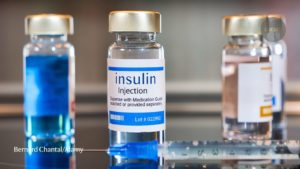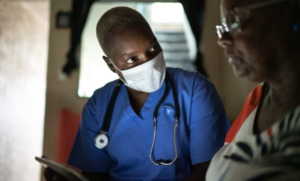
Q: Are people with diabetes more likely to get COVID-19?
A: There is not enough data to show whether people with diabetes are more likely to get COVID-19 than the general population. The problem people with diabetes face is they’re more likely to have worse complications if they get it, not a greater chance of getting the virus. Also, the more health conditions someone has (for example, diabetes plus heart disease), adds to their risk of getting those serious complications from COVID-19. Older people are also at higher risk of complications if they get the virus.
Q: Do people with diabetes have a higher chance of serious complications from COVID-19?
A: People with diabetes are more likely to have serious complications from COVID-19. Your risk of getting very sick from COVID-19 is likely to be lower if your diabetes is well-managed. Having heart disease or other complications in addition to diabetes could worsen the chance of getting seriously ill from COVID-19, like other viral infections, because more than one condition makes it harder for your body to fight the infection.
Q: Are the risks different for people with type 1 and type 2 diabetes?
 A: Currently, they are reporting that people of any age with certain underlying medical conditions, including type 2 diabetes, are at increased risk of severe illness from COVID-19.
A: Currently, they are reporting that people of any age with certain underlying medical conditions, including type 2 diabetes, are at increased risk of severe illness from COVID-19.
Based on reports, people with type 1 or gestational diabetes might be at an increased risk for severe illness from COVID-19. Because COVID-19 is a new disease, we don’t know as much as we’d like to about how underlying medical conditions increase the risk for severe illness from COVID-19.
It’s important to remember that people with either type of diabetes can vary in their age, complications they’ve developed and how well they have been able to manage their diabetes. People who already have diabetes-related health problems are likely to have worse outcomes if they contract COVID-19 than people with diabetes who are otherwise healthy, whichever type of diabetes they have.
Q: Do I need to worry about DKA (diabetic ketoacidosis)?
A: When sick with a viral infection, people with diabetes do face an increased risk of diabetic ketoacidosis (DKA), commonly experienced by people with type 1 diabetes.
DKA can make it challenging to manage your fluid intake and electrolyte levels—which is important in managing sepsis. Sepsis and septic shock are some of the more serious complications that some people with COVID-19 have experienced.
Learn the signs of diabetic ketoacidosis (DKA) and be sure to talk with your diabetes care team about when to check for ketones and when to contact your doctor if you have them. And if you are sick, know what to do.
Q: Does COVID-19 cause diabetes?
A: We don’t yet have evidence as to whether COVID-19 would contribute to the onset of diabetes.

Q: Is COVID-19 different from the seasonal flu?
A: COVID-19 is proving to be a more serious illness than seasonal flu in everyone, including people with diabetes. All of the standard precautions to avoid infection that have been widely reported are even more important when dealing with this virus.
We encourage people with diabetes to follow the public health guidance to be sure you’re doing everything you can to protect yourself and others. As always, people with diabetes should get a flu shot this year, although it’s important to understand the flu vaccine will not protect against COVID-19.
Q: What are the symptoms and warning signs I should be watching out for?
A: People with COVID-19 have reported a wide range of symptoms, ranging from mild symptoms to severe illness. Symptoms may appear 2-14 days after exposure to the virus. Pay attention for potential COVID-19 symptoms including: Fever or chills; cough; shortness of breath or difficulty breathing; fatigue; muscle or body aches; headache; new loss of taste or smell; sore throat; congestion or runny nose; nausea or vomiting; diarrhea.


